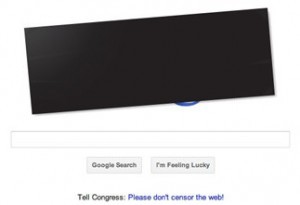Wikipedia & Google Blackout Protest over SOPA
In an unprecedented show of solidarity, Wikipedia and Google, two internet giants, recently joined forces to protest against what they perceive as a threat to online neutrality. The digital behemoths are taking a stand to safeguard the principles that underpin the World Wide Web, and their united front has sent shockwaves through the tech industry. This article explores the details of this significant protest and the implications it carries for businesses and internet users ali
Wikipedia and Google’s Protest
Wikipedia, the online encyclopedia, and Google, the world’s leading search engine, revealed their joint protest in response to mounting concerns about the future of online neutrality. This alliance was unveiled through a series of public statements and actions that have caught the attention of digital professionals worldwide
The Blackout
Wikipedia shut down its services in protest over an anti-piracy bill ‘Stop Online Piracy Act (SOPA)’ and ‘Protect IP Act (PIPA)’. that could affect the World Wide Web. Instead of the usual information pages that Wikipedia serve, visitors to the popular site are now greeted with an ominous black screen and the following:
“Imagine a World without Free Knowledge
“For over a decade, we have spent millions of hours building the largest encyclopaedia in human history. Right now, the U.S. Congress is considering legislation that could fatally damage the free and open Internet. For 24 hours, to raise awareness, we are blacking out Wikipedia”
It then links to a page explaining why Wikipedians have chosen to protest SOPA with a blackout.
The 24-hour closure of Wikipedia began at midnight on 18th January 2012. Google also followed suit by blacking out its logo with the message:
“Tell Congress: Please don’t censor the web!”
The Core Issue: Threats to Online Neutrality
At the heart of this protest is the alarming erosion of online neutrality, a fundamental principle that has long underpinned the internet’s democratic nature. Online neutrality ensures that all data on the internet is treated equally, without discrimination. It prevents internet service providers (ISPs) from favouring or throttling certain websites or online services. Wikipedia and Google’s concerns have been triggered by recent developments that threaten this principle.
The Battle Against Internet Service Providers (ISPs)
ISPs are key players in the Internet ecosystem, providing the infrastructure that allows users to access the web. However, concerns have arisen that some ISPs may be compromising online neutrality by exerting control over the internet’s infrastructure. Wikipedia and Google fear that this could lead to a scenario where certain websites or online services are given preferential treatment, stifling competition and innovation.
Wikipedia’s Role in the Protest
Wikipedia, a crowd-sourced encyclopedia that relies on open access to information, is particularly vulnerable to any threats to online neutrality. The platform’s content is created and maintained by volunteers from around the world, and its accessibility to users globally relies on an open and neutral internet. Any compromise to online neutrality could impact Wikipedia’s ability to provide free, unbiased information to millions.
Google’s Stance on the Issue
Google, a company deeply integrated in internet culture, has also taken a firm stance in this protest. The search giant emphasises the importance of a free and open internet in fostering innovation and supporting businesses of all sizes. Google’s services, including its search engine and cloud-based tools, depend on a neutral internet to reach users worldwide. Any disruptions to online neutrality could hinder its operations and affect businesses that rely on its platforms.
Implications for Business Professionals
This united protest by Wikipedia and Google carries significant implications for business professionals. An internet without online neutrality could result in increased costs for businesses that rely on online advertising or cloud-based services. Moreover, it could limit the ability of startups and smaller enterprises to compete on a level playing field, as larger companies with more resources may gain an unfair advantage.
What’s at Stake for Internet Users
Beyond businesses, internet users themselves have a lot to lose if online neutrality is compromised. Reduced access to information, slower internet speeds, and potential limitations on the websites and services available could all impact the online experience for individuals and businesses alike.
In joining forces to protest against the threats to online neutrality, Wikipedia and Google have sent a powerful message to the tech industry and the wider world. Their actions underscore the critical importance of a free and open internet to businesses and individuals alike. As the battle for online neutrality continues, it remains imperative for all stakeholders to protect the principles that have made the Internet a powerful tool for information, innovation, and communication.
Companies Against the SOPA and PIPA Bills
A few notable companies that are supporting the protest against PIPA and SOPA are:
- Google – “Please don’t censor the web”
- Facebook – “Facebook opposes SOPA and PIPA, and we will continue to oppose any laws that will hurt the Internet,” (Mark Zuckerberg)
- Wikipedia – “Imagine a World without Free Knowledge”
- WordPress – “Stop Censorship”
- Mozilla – “We Believe in an Open Web. And we’re dedicated to keeping it free, open and accessible to all”
- Reddit – “Stopped they must be; on this all depends.”
There are many more companies not supporting SOPA and PIPA with some going public. A large number of the protesting sites requested readers to take action at the Stop American Censorship website.





Google and Wikipedia are not the only sites to protest the PIPA bill. WordPress also placed a black strip across the top of the website that announced STOP CENSORSHIP. My daughter was shocked and dismayed that Burberry is one of the companies that are supporting the bill and vowed not to shop there anymore.
Surely there are better ways of combating piracy than supporting Bills that could have wider effects on the web in general. It seems like a way to take control of the Internet and start dictating policy.
We are glad Obama has turned his back on PIPA even at the expense of being shunned by the large movie studios for hand-outs at election time.
Hi Jason
Thanks for your thoughts and comment. Yes there are other ways and ideas that companies in the fashion and retail sector can implement to fight piracy and copying of their products without hurting the freedom of the web.
As far as I know the intended SOPA legislation has been withdrawn and pretty much defeated due to the massive protest of Internet users.
this is all about control. it’s about quieting people that disagree with Obama and the liberals. quieting anyone that don’t agree with the democrats. if they control our words, they can control us (so they think)… this is not American. it’s wrong. it’s a power struggle to keep power.